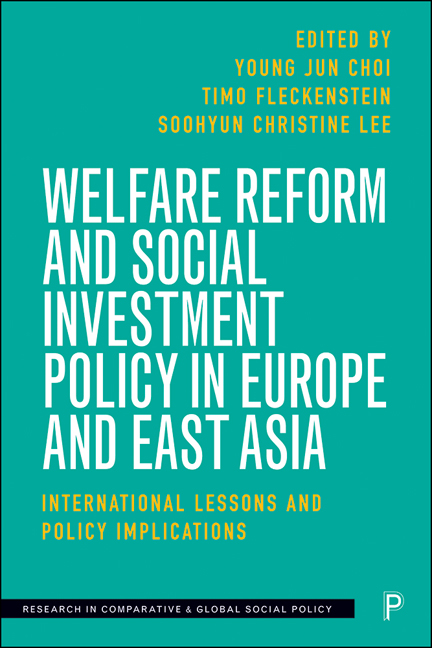 Welfare Reform and Social Investment Policy in Europe and East Asia
Welfare Reform and Social Investment Policy in Europe and East Asia Book contents
- Frontmatter
- Contents
- List of figures and tables
- Notes on contributors
- Acknowledgements
- Preface from the series editors
- 1 Introduction: social investments and welfare reform in Europe and East Asia
- 2 Work–family policy expansion and the idea of social investment: the cases of Germany, England, South Korea and Japan
- 3 Private education in South Korea: lessons for the West from past mistakes?
- 4 How do family background and shadow education affect academic performance and labour market outcomes in South Korea? Reasons for redistributive social investment
- 5 Employability, higher education and the knowledge economy
- 6 Does social investment make the labour market ‘flow’? Family policies and institutional complementarities in Italy, Spain, Japan and South Korea
- 7 The social investment approach and gender division of housework across East Asia and Europe
- 8 Employment outcomes of social investment in latecomer countries
- 9 Estimation of the human capital depreciation rate: an international comparison and policy implications in South Korea
- 10 Changing patterns of grandparenting and their implications for active ageing in England and South Korea
- 11 The governance of social investment policies in comparative perspective: long-term care in England and South Korea
- 12 Towards greater social investments and equality in Europe and East Asia: policies and politics
- Index
8 - Employment outcomes of social investment in latecomer countries
Published online by Cambridge University Press: 21 December 2021
- Frontmatter
- Contents
- List of figures and tables
- Notes on contributors
- Acknowledgements
- Preface from the series editors
- 1 Introduction: social investments and welfare reform in Europe and East Asia
- 2 Work–family policy expansion and the idea of social investment: the cases of Germany, England, South Korea and Japan
- 3 Private education in South Korea: lessons for the West from past mistakes?
- 4 How do family background and shadow education affect academic performance and labour market outcomes in South Korea? Reasons for redistributive social investment
- 5 Employability, higher education and the knowledge economy
- 6 Does social investment make the labour market ‘flow’? Family policies and institutional complementarities in Italy, Spain, Japan and South Korea
- 7 The social investment approach and gender division of housework across East Asia and Europe
- 8 Employment outcomes of social investment in latecomer countries
- 9 Estimation of the human capital depreciation rate: an international comparison and policy implications in South Korea
- 10 Changing patterns of grandparenting and their implications for active ageing in England and South Korea
- 11 The governance of social investment policies in comparative perspective: long-term care in England and South Korea
- 12 Towards greater social investments and equality in Europe and East Asia: policies and politics
- Index
Summary
Introduction
In the mid-1990s, a new economy marked by the explosive growth of information and communications technology (ICT) is more strongly dependent on the use of knowledge than ever before across advanced capitalist democracies (OECD, 1996). As knowledge is embodied in human beings, the economy places emphasis on human capital investment which generates a highly skilled workforce, especially in the service sector. Post-industrial societies, coupled with the transition to the knowledge-based economy, have faced new social needs and demands in family life and the labour market, which are labelled ‘new’ social risks. According to Bonoli (2005) and Taylor-Gooby (2004), new social risks are generally related to three factors: (1) the problem of reconciling work and family life (mostly, care for children or frail elderly family members) as a result of the massive labour market participation of women, (2) the risk of being unemployed or paid low wages due to low/obsolete skills, (3) the risk of insufficient protection in social security schemes for workers engaged in atypical jobs like part-time and temporary work. These new social risks most seriously affect vulnerable groups such as low-skilled workers, women and young people. They are different from the ‘old’ social risks of industrialised economies – the risk of sickness, unemployment and retirement of the male breadwinner – against which protection is available in the form of unemployment insurance and pensions contingent upon fulltime employment.
In the process of economic and social transformation, advanced capitalist democracies have modernised their welfare state settlements, especially by developing social investment policies. As such, a social investment perspective is intended, on the one hand, to sustain the knowledge-based economy, where knowledge accumulation of a skilled workforce entails higher productivity and economic growth, and, on the other, to better address new social risks that people face in successive stages of their life courses (Morel et al, 2012). Above all, the idea is based on an understanding that skill development and facilitation of employment are the best responses to workers’ needs and the best prevention against the new risks. As a consequence, central to the work-oriented policy tool are active labour market policies (ALMPs) and work–family policies (WFPs). Childcare, for example, is expected to not only allow children to improve cognitive and non-cognitive abilities through high-quality early childhood interventions, but help mothers of young children to engage in paid employment.
- Type
- Chapter
- Information
- Welfare Reform and Social Investment Policy in Europe and East AsiaInternational Lessons and Policy Implications, pp. 189 - 212Publisher: Bristol University PressPrint publication year: 2021


